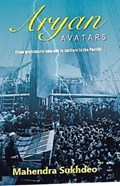In the backdrop of an autobiographical canvas, the author attempts to explore the anthology of embryonic influences that have shaped the character of his undiluted, earthy ancestral village near the India-Nepal border. While probing the ethereal sphere of pre-historic darkness and the antecedents of the aryan roots over the convoluted passage of three millennia, he describes the significant impact on the Indian psyche of the Indus Valley Civilisation, hegemonic Hindu kingdoms, Islamist/Mughal conquests, and Western colonialism. Of particular importance is the course of the Indian Indenture System that catapulted thousands of illiterate and poverty-stricken peasants to distant European colonial outposts in search of El Dorado of their dreams.
The graphic narrative of rural India captures his quintessential visit to Kabuliha in 1961. The rustic descendants mull over the economic prosperity and social lifestyle of the People Of Indian Origin (PIO) living in distant lands and perceive of them as living avatars. Of all the labour recipient countries, Fiji evoked deep awe and respect as mythically, it was Krishna's 'Ramnik Dweep' (beautiful island) and the media caricatured it as the 'Little India' of the Pacific.
Born and bred in Fiji in the religiosity of eclectic Hinduism, he charts the metamorphosis from an orthodox Hindu moorings to the realm of Marxist socialism and active atheism.
While previewing the pockmarked sphere of Fiji's divisive colonial cesspit, he ponders on the corrosive culpability of racism, the rise and fall of a displaced communal entity in the corridors of Fiji's polity, and the painful dispersal of an enterprising ethnic group in the aftermath of Fiji's first coups of 1987.
He writes with some passion and panache on his involvement in the birth of Fiji Labour Party, disenchantment with the Party's pre-1987 electoral polemics and his absorption by the ruling Alliance Party. While sitting as the Acting Lord Mayor of the capital city in 1987, he describes the unfolding drama of the first two coups in Suva and the evolving rubric of coup culture. In the background of these political distortions, he ventures to predict what future might hold for fiji.
As a work of socio-political research, the book is projected as a must read primer for anyone interested in pre-history, religion, ancestry, colonialism, translocation of people, and Fiji's politics.

